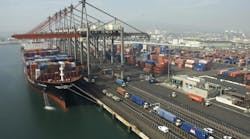The ongoing labor contract negotiations between the International Longshoremen's Association (ILA) and the U.S. Maritime Alliance (USMX) involving 14 container ports running from Maine to are creating something of silver lining for a range of trucking companies due temporary freight “diversions,” according to one Wall Street firm.
David Ross, a transportation analyst with Stifel Nicolaus, noted in a research brief that despite a greater willingness on the part of the ILA and USMX to resolve their differences – the two sides agreed to a 30-day extension of the existing contract last week to stay at the bargaining table – many shippers had already re-directed freight shipments through West Coast ports just in case a strike did take place.
“With no significant trade disruptions expected, it should be business as usual at the ports in January,” Ross explained. “Since many retailers had already planned for a strike and shipped early or diverted shipments to West Coast ports, it wouldn't surprise us to see lower than normal volumes in January running through those [East and Gulf coast] ports anyway.”
He added that the potential beneficiaries from temporary diversion to the West Coast to serve East Coast customers could be trucking firms like Swift Transportation or intermodal-focused carriers such as J.B. Hunt.
But while the contract extension – which expires Jan. 28 – indicated the ILA and USMX are closer to settling their differences, especially regarding container royalty payments, Ross believes the overall domestic freight environment for the first quarter of this year may provide more challenges than expected,
“Regardless of what goes on with the ports, we believe the first quarter could be a difficult comp for the U.S. transport companies due to the very mild weather in the first quarter of 2012 that caused a pull-forward of some springtime shipments and reduced operating costs with no winter clean-up necessary,” he explained.
“At best, the weather will again be mild, but another harsh winter could lead to negative year-over-year volumes, revenues, and/or EPS [earnings per share] growth,” Ross stressed.



